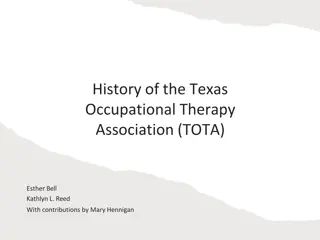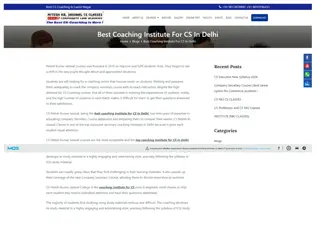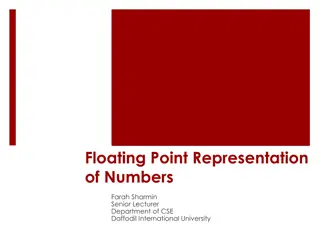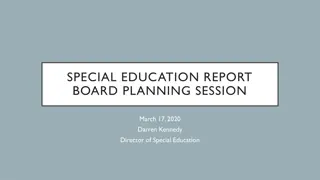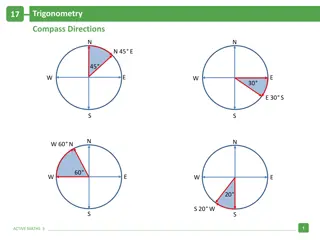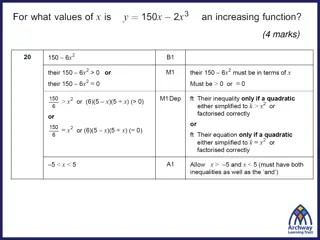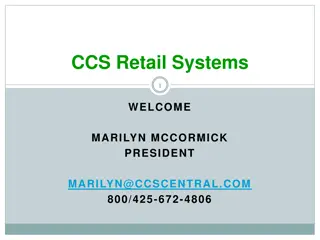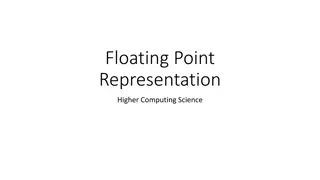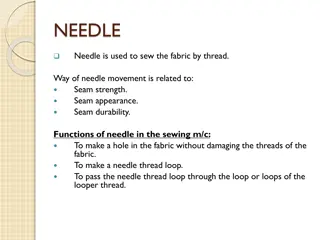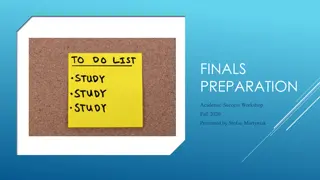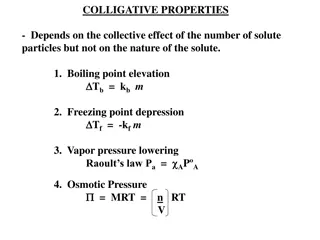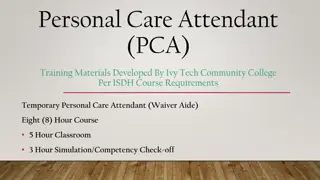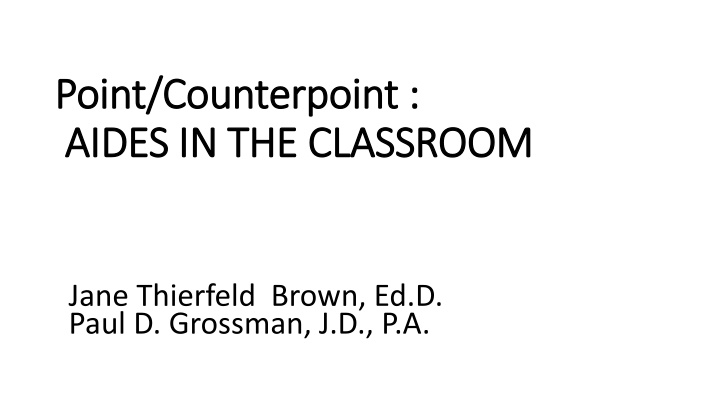
Legal Considerations for Students with Disabilities in the Classroom
Exploring the legal framework surrounding the qualification of students with disabilities who require full-time aides in educational settings. The discussion delves into essential academic and technical standards, compliance with codes of conduct, and ensuring the health and safety of all individuals involved.
Download Presentation

Please find below an Image/Link to download the presentation.
The content on the website is provided AS IS for your information and personal use only. It may not be sold, licensed, or shared on other websites without obtaining consent from the author. If you encounter any issues during the download, it is possible that the publisher has removed the file from their server.
You are allowed to download the files provided on this website for personal or commercial use, subject to the condition that they are used lawfully. All files are the property of their respective owners.
The content on the website is provided AS IS for your information and personal use only. It may not be sold, licensed, or shared on other websites without obtaining consent from the author.
E N D
Presentation Transcript
Point/Counterpoint : Point/Counterpoint : AIDES IN THE CLASSROOM AIDES IN THE CLASSROOM Jane Thierfeld Brown, Ed.D. Paul D. Grossman, J.D., P.A.
The Question of Whether, The Question of Whether, Students With Autism or Intellectual Disabilities, Students With Autism or Intellectual Disabilities, Who Need Full Time Aides to Attend Class, Who Need Full Time Aides to Attend Class, Are Otherwise Qualified Students with Are Otherwise Qualified Students with Disabilities ? Disabilities ? Jane T. Brown, Ph.D. Paul D. Grossman, J.D., P.A.
I. A Legal Paradigm through which I. A Legal Paradigm through which to Consider the Question at Hand to Consider the Question at Hand
The Legal Paradigm The Legal Paradigm Grossman s Restatement Grossman s Restatement (1) (1) Generally, only otherwise qualified individuals with disabilities (QIDs) are protected from discrimination on the basis of disability by Section 504 of the Rehabilitation Act of 1973 as well as Titles I-III of the Americans with Disabilities Act of 1990 Southeastern Community College v. Davis, 442 U.S. 397 (1979), as clarified in Alexander v. Choate, 469 U.S. 287 (1985) Under the regulations implementing Section 504, to be otherwise qualified, an individual must meet the academic and technical standards requisite to admission or participation in the recipient's education program or activity 34 C.F.R. section 104.3 (l)(3) Though not on the face of the regulation, applying principles developed under Title I of the ADA, the modifier essential will be read into the above regulation as in essential academic standards Shaikh v. Texas A&M Univ. Coll. of Med., No. 16-20793, 2018 WL 3090415 (5th Cir. June 20, 2018)
The Legal Paradigm The Legal Paradigm Grossman s Restatement Grossman s Restatement (2) (2) An element of meeting essential technical qualifications is the ability to comply with the essential elements of the code of conduct, likely including those pertaining to disruption and academic integrity assuming such standards are applied in a consistent and even-handed manner, not as a pretext for discrimination Stebbins v. University of Arkansas, Civil No. 10- 5125, 2012 WL 6737743, W.D. Ark (2012); 543 Fed. Appx. 616, 8thCir. (2013); Cert. Denied, 134 S.Ct. 2145 2014; Michaela Bied v. Cty. of Rensselaer, Hudson Valley Community College, No. 115CV1011TJMDEP, 2018 WL 1628831 (N.D.N.Y. Mar. 30, 2018) Irrespective of what is otherwise in the code of conduct, another technical standard which must be met is the ability to not represent a direct threat to the health and safety of others. School Bd. of Nassau County, Florida v. Arline (S.Ct. 1987) [There is no similar requirement with regard to solely representing a direct threat to self ]
The Legal Paradigm The Legal Paradigm Grossman s Restatement Grossman s Restatement (3) (3) A student who requires an accommodation/modification [academic adjustment or auxiliary aid] in order to meet the above standards, remains qualified if he or she can identify a reasonable accommodation that will enable him/her to meet all the essential academic and technical standards and is willing to make use of that accommodation(s). Southeastern v. Davis The burden of identifying such a accommodation is on the student provided that the college enters into good faith interactive communications with the student [or guardian(s)] to identify, on an individualized basis the effective accommodation Mbawe v. Ferris State Univ., case No. 18-1046, 751 Fed.Appx. 832, 2018 WL 5793188 (6thCir., November 2018)[unpublished]; cert. den., 139 S.Ct. 2022 (Mem), 2019 WL 1171674 May 2019.
The Legal Paradigm The Legal Paradigm Grossman s Restatement Grossman s Restatement (4) (4) At least in litigation, the burden would be on the student to show that his/her proposed accommodation is necessary and reasonable (logically connected to the impaired function and feasible on its face reasonable in the ordinary run of cases ) K.C. Martin v. PGA, 532 U.S. 661 (2001); US Airways, Inc. v. Barnett, 535 U.S. 391 (2002) Under the regulations implementing Section 504, a continuing personal service at the school s expense is not a reasonable accommodation 34 C.F.R. section 104.44(d)(2) At least in litigation, once the student has met his/her burden, the school bears the burden of proof with regard to any objections to implementation of the proposed accommodation that are based on undue burden or fundamental alteration U.S. Airways v. Barnett; Gati v. Western Kentucky University, et al., No. 3:14-CV-544-DJH-CHL, 2017 WL 4288749 (W.D. Ky. Sept. 27, 2017); Featherstone v. Pac. N.W. Univ. of Health Sciences, D.C.E.D. Wash., No. 1:CV-14-3084-SMJ (2014); To assert the affirmative defenses of undue burden and fundamental alteration may require that the college demonstrate that it went through certain requisite procedural steps Wynne v Tufts Medical Center, 976 F.2d 791 (1stCir. 1992); Guckenburger v. Boston University, 8 F. Supp. 2d 82 (D. Mass. 1998); Zukle v. Regents of Univ. of Cal., 1666 F.3d 1041 (9thCir. 1999); Wong v. Regents of Univ. of Cal., 192 F.3d 807 (9thCir. 1999), 410 F.3d. 1052 (9thCir. 2005); Featherstone v. Pac. N.W. Univ. of Health Sciences; Bied v. Cty. of Rensselaer, Hudson Valley Community College; Gati v. Western Kentucky University, et al.
The Legal Paradigm The Legal Paradigm In employment law, the duty to accommodate does not include reassigning an essential job function to another human-being but there is plenty of room for debate about what is the exact function in dispute and which functions are essential Searls v. Johns Hopkins Hospital, 158 F.Supp.3d 427, 2016 WL 245229 (D. Maryland 2016) In employment law, there is scant litigation over whether cooperation with a supported employment program is a form of reasonable accommodation, even when not at the employer s expense Compare Equal Employment Opportunity Commission v. Wal-Mart, 345 F.Supp.3d 1046, 2018 WL 6622201 (D.C Wisconsin 2018) and EEOC v. Hertz Corporation, 1998 WL 5694 (E.D. Mich. 1998) Not reported Outside of the employment setting, for persons on the Autism Spectrum and persons with Intellectual Disabilities the potential range of necessary and legally mandated accommodations is quite broad A.L. by and through D.L. v. Walt Disney Parks and Resorts US, Inc., 900 F.3d 1270, 2018 WL 3948677 (11thCir. August 2018); Doe v. Skidmore Coll., No. 117CV1269LEKCFH, 2018 WL 3979588 (N.D.N.Y. Aug. 20, 2018) Grossman s Restatement Grossman s Restatement (5) (5)
II. A Case Study II. A Case Study
Case Study: Case Study: Doe v Skidmore College: Doe v Skidmore College: Introduction Introduction No. 117CV1269LEKCFH, 2018 WL 3979588 (N.D.N.Y. Aug. 20, 2018) Not a case about a student with Autism or an Intellectual Disability; instead Major Depressive Disorder and AD/HD Parents of student want, as an accommodation, direct notice from all faculty of the deadlines and assignments for their daughter, so that they may keep her on track and make-up work that has exceeded deadlines College, calling this proposed accommodation a fundamental alteration and undue burden, moves for summary judgment in its favor The court declines to issue a summary judgment order, authorizing the matter to proceed to trial
Case Study: Case Study: Doe v Skidmore College: Rational Doe v Skidmore College: Rational of the Court of the Court (1) (1) There is no indication that the Contested Accommodations would require Defendant to fundamentally alter its graduation requirements, nor would they allow Plaintiff to avoid completing her work and graduating in a timely manner. Instead, at stake here is Defendant s interest in ensuring that its graduates are sufficiently independent such that they become responsible and productive citizens in society, which must be balanced against the extent of Plaintiff s depression and ADHD as they relate to her ability to independently manage her studies. Although the Court sympathizes with Defendant s objective, it will not find as a matter of law that relaxation of its goals would be unreasonable or unduly burdensome when, as here, a student has been diagnosed with a disability that could plausibly affect her ability to handle all of the deadlines associated with a full undergraduate course load. Those relevant questions of fact [ ] presumably will be elucidated by the discovery process and, if appropriate, trial. [emphasis added] [Citations omitted]
Case Study: Case Study: Doe v Skidmore College: Rational Doe v Skidmore College: Rational of the Court of the Court (2) (2) The Complaint asserts that Plaintiff is an intelligent and talented student, but that her disability makes it difficult for her to independently maintain her study schedule. Surely, Defendant has an interest in ensuring that its graduates have complied with all of their academic requirements, and the nature of its undergraduate program would be altered if that interest were undermined. But it is not clear to the Court that implementing the Contested Accommodations by essentially requiring Plaintiff s professors to spend more time communicating with Plaintiff, Plaintiff s parents, and administrative officials would fundamentally alter Defendant s program.
III. Foundational Questions III. Foundational Questions for Discussion for Discussion
Question # 1: Question # 1: What is the Purpose of Higher Education? What is the Purpose of Higher Education? Develop future scholars and research experts? Develop individuals for future employment? Affirmation of the humanity of the student? Foster in students self-understanding and insight? Foster in students self-sufficiency? End social isolation and expose individuals with disabilities to role model peers? Intellectual stimulation? Sensory stimulation? Keep a wide-range of taxpayers happy? How does your answer impact the question at hand concerning use of aides in the post-secondary classroom?
Critical Questions about Full Critical Questions about Full- -Time Aides Are there any circumstances under which a college must provide a student on the Autism Spectrum or a student with an Intellectual Disability a full-time aid at its expense? When is permitting aides to accompany students on a full time basis, as an accommodation, reasonable ? When is permitting full time aides necessary as a form of accommodation? When would reliance upon an aid by a student be a fundamental alteration or an undue burden, when not? If aides must be accepted as a form of accommodation, what limitations could or should be placed on the aides to preserve legitimate academic standards? Time Aides
Critical Question #2 Who is the student? Who is the student? Who is doing the work? What is the purpose of the aide (behavior, focus, access??) Who is participating in the education, student or aide?
IV. Questions in the IV. Questions in the Hypothetical Hypothetical Based On DSCHE Submissions
Question #1 This week, I met with an incoming student with ASD, his mom, and his aide/mentor to discuss the accommodations the student would be requesting. During the meeting, it quickly became evident that the student (who is verbal), won't answer questions without receiving verbal or gesture prompts from his aide. I was told that the aide absolutely must be at the students side at all times, as he is unable to keep his behavior in check on his own. After asking the student just two questions (tell me something about yourself, and tell me how your disability affects you in class), the aide interrupted stating that this was too much conversation for the student.
Cont I explained that he will be a student in a college classroom, where he will be expected to interact, converse, and engage with his instructors and classmates. I was then informed of the following: the student will not engage in conversation, he prefers to have the aide speak on his behalf in class; the student requires frequent redirection of Autistic behaviors in class, whether that be talking loudly or softly to himself, or performing self stimulating behaviors such as rocking, hitting himself, banging his head, and frequently getting up to walk around the classroom or into other classrooms (I asked how often this occurs and was told several times per hour), can only follow one step commands, and is unable to contain himself in a classroom or public space without the aide by his side.
Question #2 It is not uncommon for us to receive requests for a specific proctor that a student may have had throughout high school to attend placement tests. The rationale from the parent, personal attendant, or student is frequently proffered that they know the students needs and can help them to understand. That same request is very often made to accompany the student into the classroom.
CONT Our institution does not generally allow parents in the classroom even as personal attendants. If the student is accepted into a college program, what happens in the classroom environment? Is it the parent s expectation that they will accompany the student to all classes? If the mother becomes ill and is unable to attend, does the student then miss class as well? It is unfortunate that the student is solely dependent upon his mother for communication.


